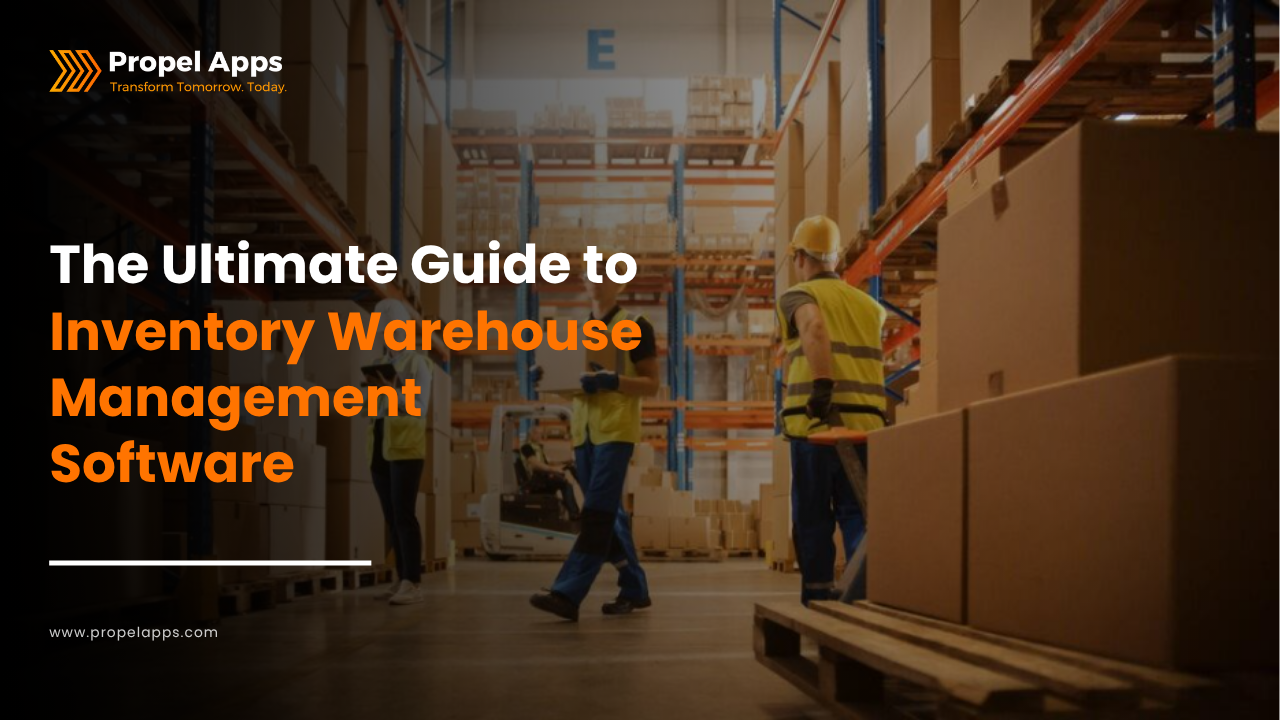
It is no exaggeration to state that a properly organized warehouse with well-stocked inventory at the right places will make an organization successful, while earning the trust of its customers. In other words, keeping your warehouse running smoothly is super important if you want to stay ahead of the game.

As businesses grow and customers expect more, juggling inventory can get pretty tricky. That's where inventory warehouse management software (WMS) steps in to save the day. In this guide, we'll break down everything you need to know about WMS—what it is, what it can do, the different types, and the benefits of using it. Lastly, we will talk about why a mobile WMS solution is the right choice over a conventional WMS, the parameters you need to consider before you invest in it, and why Propel Apps' mobile WMS is the ideal choice for your warehouse.
Inventory warehouse management software is a specialized system designed to manage and streamline warehouse operations. It encompasses a wide range of functions, including inventory tracking, order fulfillment, shipping, receiving, and storage management. The primary goal of WMS is to ensure that products are available when needed, enhancing accuracy and efficiency throughout the warehouse.
A robust WMS integrates seamlessly with other business systems such as ERP (Enterprise Resource Planning) and CRM (Customer Relationship Management). This integration provides a holistic view of operations, enabling better decision-making and improving overall supply chain efficiency.
WMS solutions come in various forms, each suited to different business needs and warehouse operations:
Standalone systems focus entirely on warehouse management and often offer deep features for inventory control, order processing, and workflow optimization. However, they may require third-party integration for ERP and CRM systems.
Some ERP systems include a WMS module, providing built-in warehouse management as part of a broader suite. This ensures data consistency across departments and simplifies IT infrastructure.
Hosted on the cloud, these systems provide remote access, quicker deployments, scalability, and reduced IT costs. They’re great for businesses aiming to reduce upfront investments.
Installed locally, these solutions offer higher control and customization but come with increased infrastructure and maintenance costs.
So, which type of WMS is preferable? The answer depends on your organization’s size, operations, and future goals. That said, mobile WMS solutions are increasingly popular due to their flexibility, speed, and usability — especially in today’s fast-paced warehousing environment.
Implementing inventory warehouse management software can significantly improve your warehouse operations. Here are five major benefits:
With automated inventory tracking software, barcode scanning, and integrated workflows, WMS drastically reduces human errors. Accurate data prevents costly mistakes, returns, and customer dissatisfaction.
From picking to packing and shipping, WMS automates repetitive tasks and optimizes routing, reducing the time spent per order and improving labor productivity.
Using features like inventory cycle counting, WMS ensures real-time updates of stock levels. Businesses can prevent overstocking or stockouts by having better visibility into available stock.
WMS solutions are designed to scale with your business. Whether you're expanding your product line or increasing order volumes, a scalable WMS can adapt to your changing needs without compromising efficiency.
Improved order accuracy and faster shipping times enhance customer satisfaction and loyalty. Accurate stock information and timely order updates keep customers informed and satisfied with their Timely fulfillment and fewer errors result in happy customers. Accurate stock availability and faster shipping times build trust and loyalty.
Traditional WMS platforms have long been used to manage inventory and operations. But with the rise of mobile technology, mobile WMS solutions are now transforming warehouses into more agile, responsive, and productive spaces.
Mobile WMS allows warehouse staff to scan items and update records instantly, enabling up-to-the-minute inventory turnover analysis. Unlike traditional systems that rely on desktop terminals, mobile solutions eliminate delays and inaccuracies.
Mobile WMS empowers staff to complete tasks on the go, reducing walking time and bottlenecks. Intuitive interfaces on handheld devices also reduce the learning curve for new hires.
Equipped with barcode and RFID scanning, mobile WMS improves accuracy across picking, packing, and shipping. This also supports better inventory cycle counting, as staff can verify inventory quantities during everyday tasks, rather than waiting for year-end counts.
Mobile devices enable instant messaging and task updates, improving coordination among warehouse staff and managers.
While mobile solutions require upfront investment, their impact on productivity and reduced errors provides substantial ROI over time. Paperless operations and real-time processing further contribute to cost savings.
As your business grows, mobile WMS can adapt with you. These systems are often modular and easily upgradable, ensuring your warehouse remains competitive and tech-enabled.
Not all WMS solutions are created equal. When choosing the right inventory warehouse management software, keep these factors in mind:
Analyze pain points in your current process. Do you need better visibility? Faster fulfillment? Fewer errors? Identify which features — like inventory tracking software or advanced analytics — are non-negotiable.
Explore options that support your business size and industry. Look for providers with proven success in similar operations.
A simple, intuitive user interface is key. Your staff will be using the system daily, so ease of use matters.
Ensure the system can be tailored to match your unique workflows — whether it’s bin-level tracking or inventory turnover analysis.
Factor in not just the purchase price, but ongoing maintenance, upgrades, and training. Then weigh that against potential gains in accuracy, speed, and customer satisfaction.
If you're looking for a solution that ticks all the boxes, explore Propel Apps' mobile WMS — designed to support complex warehouse operations of any size. It integrates seamlessly with popular ERPs like SAP and Oracle, ensuring your entire supply chain is connected.
Propel’s solution offers:
Whether you’re in distribution, manufacturing, or retail, Propel Apps’ WMS helps you reduce costs, improve performance, and future-proof your operations.
Looks interesting? Schedule a free demo with us today.
